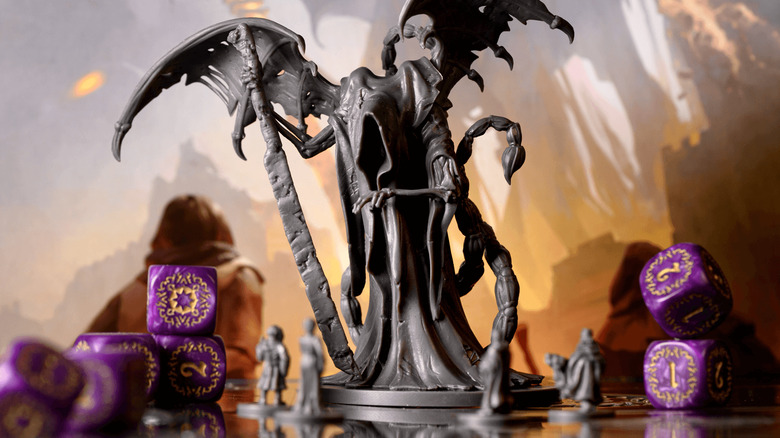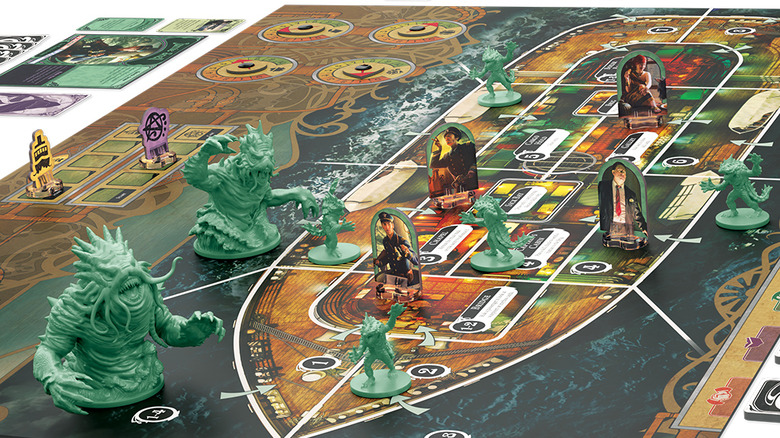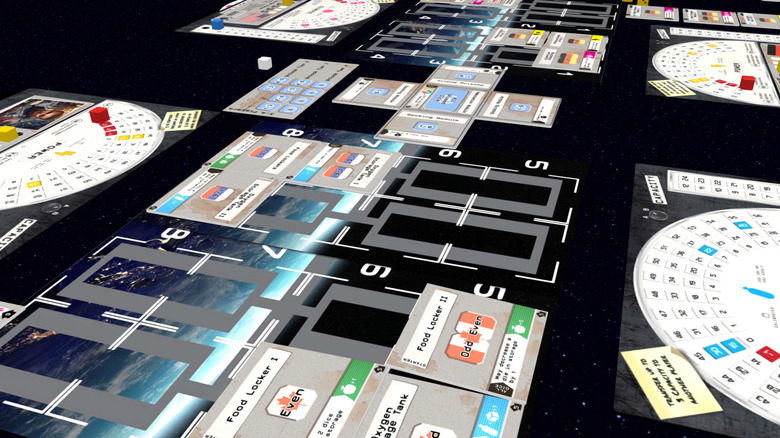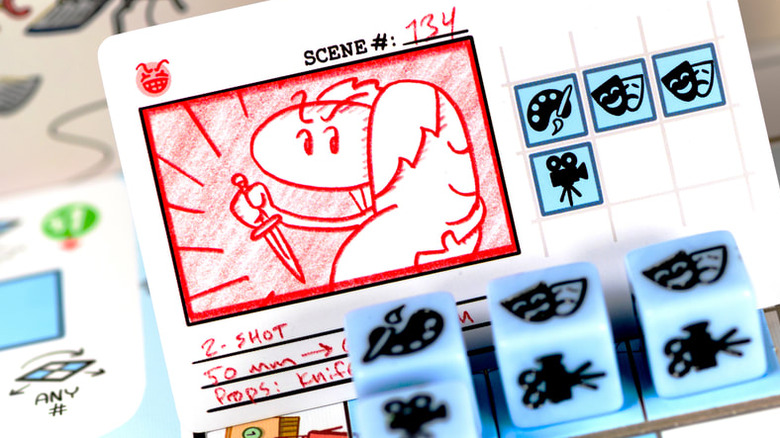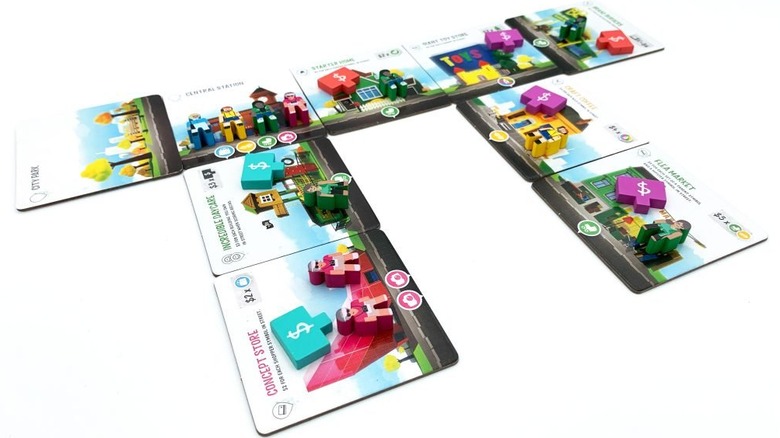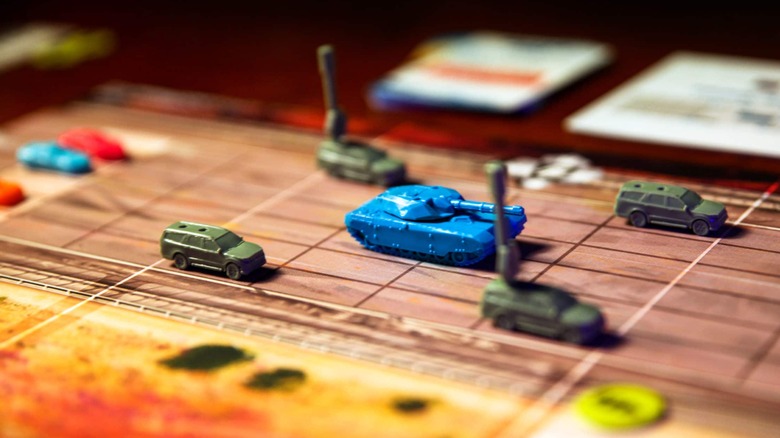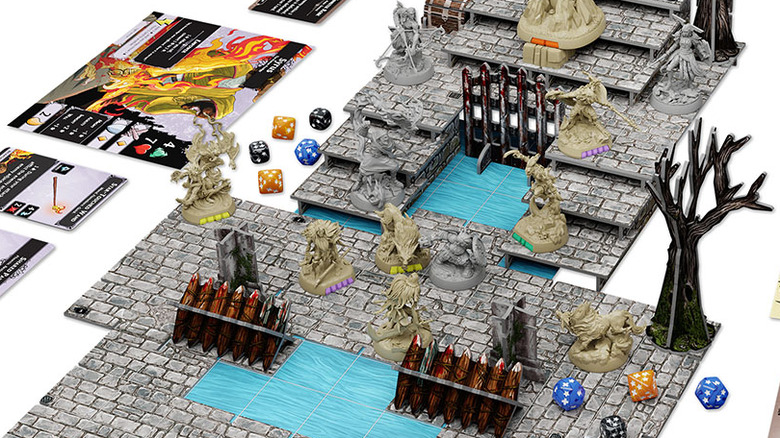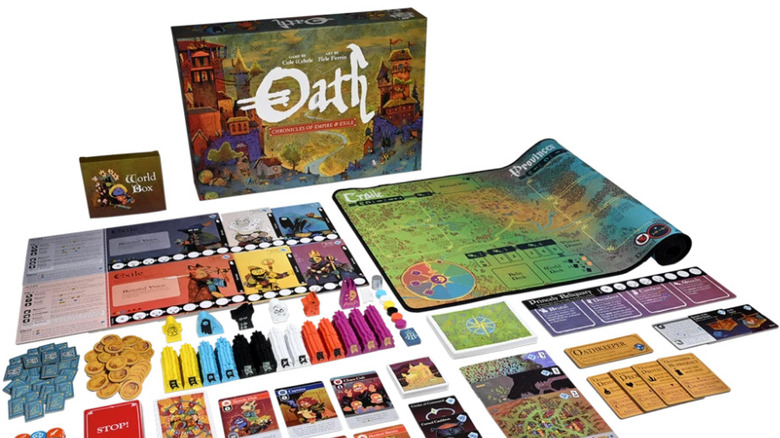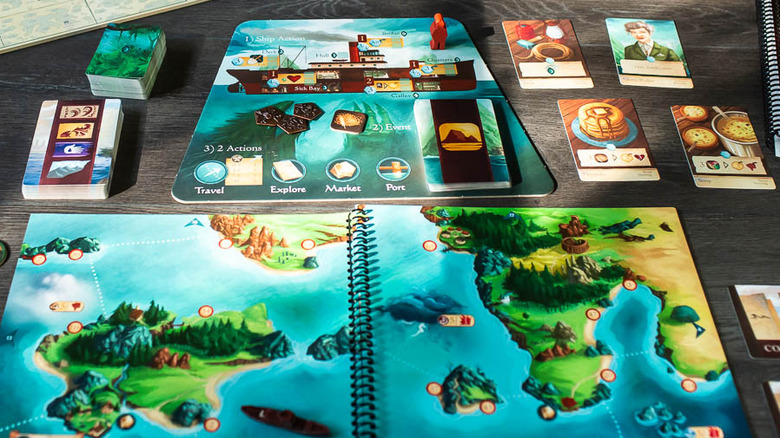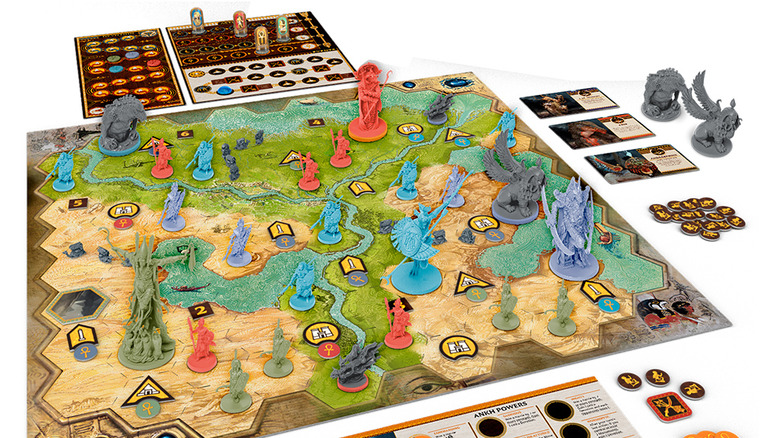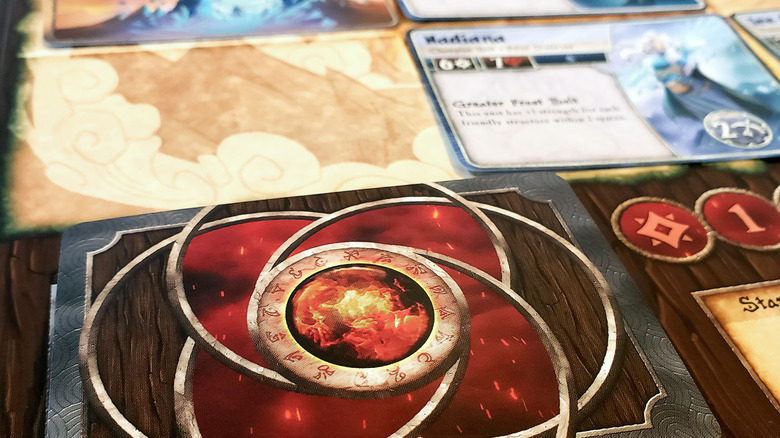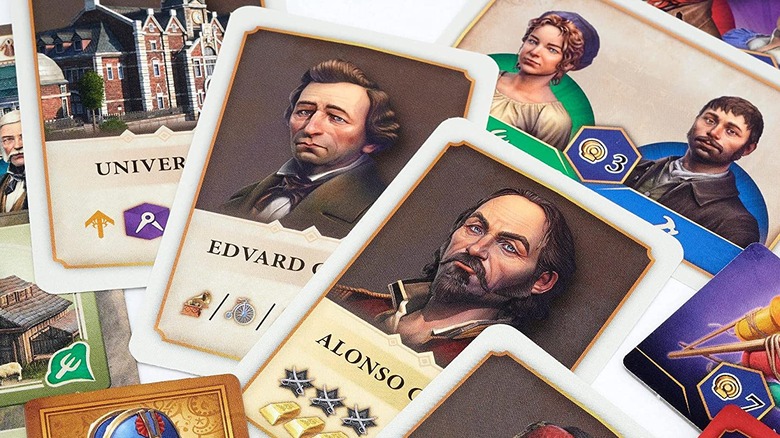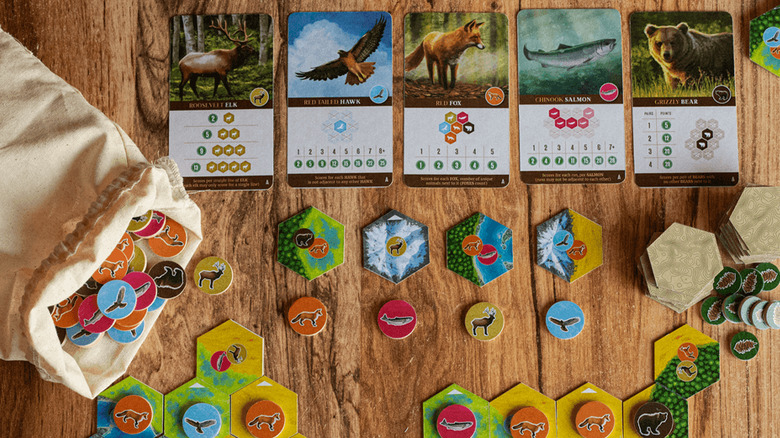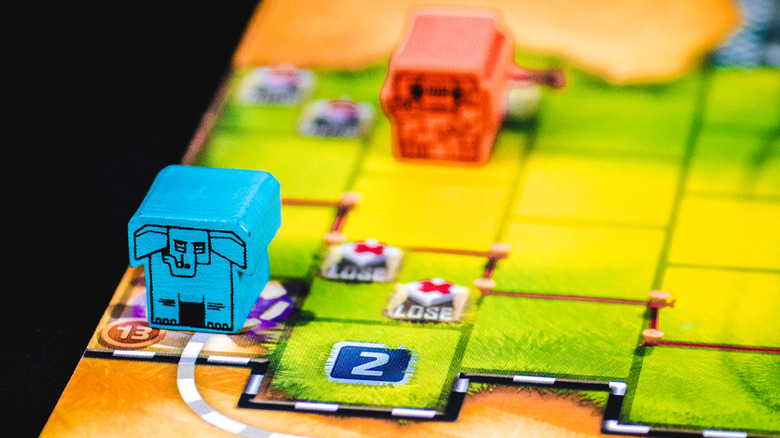The 15 Best Board Games Of 2021
We may receive a commission on purchases made from links.
In any other industry, the best titles of the year would hit the market with an appropriate amount of fanfare and industry coverage. But for board game publishers — an industry dependent upon crowdfunding and limited by global supply chain issues — many titles can slip into circulation unnoticed, even with a regular dose of fulfillment updates available to the masses. So, unless you receive advance review copies or have embarrassingly deep pockets, this may be the first time you hear about a few of the titles on this list.
But none of that should distract from another great year for board games, one that featured a title for everyone, regardless of your preferred style of play. Want to engage in countless evolving campaigns against your friends? Try "Oath: Chronicles of Empire and Exile" or "Descent: Legends of the Dark." Need something the whole family can enjoy? Break out a copy of "Streets" or "Cascadia" and place people and animals on colorful tiles. Every board game category had its moment in the sun.
And since the board game industry has yet to spawn its version of Rotten Tomatoes — seriously, someone should get on that — the following titles were selected based on a combination of BoardGameGeek scores and independent reviews. It may not reflect every good game that came out in 2021, but it should hopefully highlight some of the titles that will endure in the months and years to come.
Destinies
Sometimes, picking a suitable board game means understanding your non-tabletop interests. For example, as a marketing professional, I am a tireless advocate for the power of QR codes. As a longtime fan of franchises like Fallout and Mass Effect, I also appreciate the presence of a sound morality system. So, when I found out that some brilliant mind at Lucky Duck Games had combined these in "Destinies," I knew I had to add this game to my collection.
Like any other RPG, players will spend their turn in "Destinies" moving around the map and visiting points of interest. Unlike most board games, however, the app-assisted mechanics allow players to engage in dialogue with NPCs and engage in skill checks that push the game in new directions. The result is a cross between a board game and a text-based adventure game, the perfect option for someone who wants an iPhone RPG with a tactical component.
Given the time and money required to play the other app-assisted RPGs on this list, you might assume that "Destinies" is another clunky title. But with a modest price point and a "Medium Light" difficulty ranking on BoardGameGeek, this title seems to be a light lunch for those who have eaten their fill of more complicated titles. I know that I intend to play "Destinies" as a solo game, letting the app do the heavy lifting and enjoying the refreshing experience of not being in charge at my table.
Purchase on Amazon.
Unfathomable
For everyone who fell back in love with board games in the early 2000s, Corey Konieczka's "Battlestar Galactica: The Board Game" was a pivotal work. Combining now-ubiquitous gameplay mechanics like cooperative challenges and hidden roles — Konieczka's rulebook crawled so "Dead of Winter" could run — the game offered just the right combination of mainstream appeal and crunchy gameplay for a new generation of cardboard aficionados.
But as is so often the case with out-of-print titles, the secondary market for "Battlestar Galactica" quickly made it impossible to play. Thankfully, Fantasy Flight Games has stepped in to fill the void, working alongside Konieczka to create "Unfathomable." Fantasy Flight's new game, set in its popular Arkham Horror universe, is an unapologetic spiritual successor to "Battlestar," trading space for the ocean and Cylons for cultists and placing players aboard the steamship Atlantica.
Like "Battlestar Galactica," "Unfathomable" promises to test the loyalties of your board game group and ensure that at least one person goes home nursing a grudge. Will the human players protect the ship and chart safe passage back to land? Or will the cultists throw a wrench in their plans, revealing themselves at the worst possible time and sacrificing all passengers to the Deep Ones and their gods? Whatever the outcome, the team behind "Unfathomable" has earned nothing but rave reviews — and maybe, just maybe, found a way to improve upon a modern board game classic.
Purchase on Amazon.
Intrepid
Part of the appeal of board games is their ability to give us experiences we would never want to encounter in our everyday lives. So, while few people are clamoring to experience the events of "Apollo 13" or "Stowaway" first-hand, the puzzle-heavy prospect of surviving an international space disaster might make Jeff Beck and Jeff Krause's "Intrepid" the right title for your board game group. The duo's latest project was successfully Kickstarted in July 2020 and found its way into homes earlier this year.
In "Intrepid," up to four players work together to manage the essential resources of their crew and survive aboard the International Space Station (ISS). Each player takes on the role of a different country — Canada, Japan, Russia, and the USA each have slightly different in-game abilities — and allocate their dice to complete mission cards and survive deadly scenarios. Survive every toxic leak or meteor shower the game throws at you, and you might return home a national hero.
To keep their game grounded more in science than fiction, the design team behind "Intrepid" worked directly with an actual NASA flight controller. This means that the technology found in the game is based on real ISS science, making "Intrepid" the closest any of us — except for maybe Jeff Bezos — will ever come to living out our low-orbit fantasies. Be warned, though: like a real astronaut, you should only prepare for this mission if you're not afraid of a challenge.
Purchase on Fowers Games.
Roll Camera!: The Filmmaking Board Game
It is often said that every movie is a miracle. Even the worst titles on Netflix require a near-superhuman combination of collaboration and lucky breaks to find their way to the screen. And for those of us far removed from the production side of the industry, there may be no better way to test that adage than with Malachi Ray Rempen's "Roll Camera!: The Filmmaking Board Game." Another successful 2020 Kickstarter title, "Roll Camera," premiered in homes everywhere this past summer.
In "Roll Camera," players become the crew of an independent film — the director, production designer, producers, and more — to beat the odds and cobble together an award-winning feature. By rolling and allocating Crew dice, your team will overcome production problems, collaborate on new ideas, and string together scenes into a coherent film. Make a masterpiece — or even a "So Bad It's Great!" title — and you win, but be warned: Your budget and your schedule are working against you.
While "Roll Camera" may not be the first board game to tackle the movie industry, it comes from a place of unparalleled authority. Rempen may be a successful board game designer, but during the day he works as a filmmaker and educator; he has a background in film production and has taught at at Catalyst, an accredited creative arts and technology institute based in Berlin. No word yet on whether beating "Roll Camera" counts as a final project in his course.
Available for purchase on eBay.
Streets
Board game collectors, myself very much included, can often be seduced by complicated mechanics and gargantuan miniatures. So, when a game comes along that promises simple mechanics and elegant design, it is a welcome reminder that not every person who sits at your table reads rules PDFs for fun. Such is the case with "Streets," another 2020 Kickstarter title that emphasizes cheer over crunch.
Designed by Haakon Gaarder ("Villagers"), "Streets" is an exercise in urban planning with the kind of bright colors and colorful buildings that would make Richard Scarry proud. Players take turns placing buildings and meeples on an ever-evolving cityscape. Once a row of homes or businesses is enclosed on both ends, the street is scored, and players earn points for the buildings they own. String together related structures or dense populations on the same street, and you might find yourself a sort of benevolent real estate tycoon.
With a community rating of "Medium Light" on BoardGameGeek, "Streets" is a game anyone can pick up and enjoy, regardless of their board game experience. That makes it a solid successor to Gaarder's last game, which also received high marks as a family-friendly title. Unfortunately for American board game fans, "Streets" has been hit particularly hard by industry supply chain issues — expect to see it on more lists now that North American fulfillment has begun in earnest.
Purchase on Sinister Fish Games.
Canvas
I have a confession to make: I am a sucker for transparent cards. So, even though "Gloom" no longer holds a place in my collection, I still cherish the experience of stacking different mood modifiers to create the perfect state of unhappiness for my family. Given the wild success of Jeff Chin and Andrew Nerger's "Canvas" — which managed to narrowly beat its original $14,000 Kickstarter goal by, oh, almost $700,000 — I'm probably not the only one.
Even in a year with a fair share of accessible games, "Canvas" may be one of the simpler games to hit your table. Each player starts with a handful of inspiration tokens and a few abstract background cards. Then, during their turn, each player will either draft from a communal board of art cards or combine the art cards in their hands to finalize their canvas. Once someone has finished three paintings, scores are tallied, and the best artist wins.
It's hard not to compare "Canvas" to "Dixit," another simple game that benefits significantly from the original artwork on the cards. Both seem positioned to be delightful change-of-pace games, things you can break out to help your group catch their breath between taxing big box experiences. And while "Canvas" seems like a game designed for groups of friends, the rules do include variations for both one- and two-player combinations, just in case you're the one who needs a breather.
Purchase on Amazon.
Fast and Furious: Highway Heist
Never sleep on Prospero Hall. The Seattle-based studio might work primarily with existing properties and big-box retailers, but their games are anything but cheap. With recent titles like "Horrified" and "Jaws," Prospero Hall has walked a fine line between honoring the source material and creating something worthy of your collection. And in "Fast and Furious: Highway Heist," the designers give you a chance to game a quarter-mile at a time.
Much like the movies, you will spend a lot of your time in "Highway Heist" behind the wheel of a very, very fast car. Players will choose from a series of actions — with titles like "shake off" and "ram" — and even jump between cars for some old-fashioned brawling action. While the game favors abstracted artwork over licensed images of the cast, the game feels less like a cheap spinoff and more like a classic novelization that expands on the world and the characters.
Given its widespread availability, "Highway Heist" might be the title on this list most likely to end up on your table. But like other Prospero Hall games, the licensing itself can be a compelling hook. Odds are you have way more "Fast and the Furious" fans in your life than board game fans, so luring them in with a bucket of Corona and the promise of family can be an excellent infection vector into the broader hobby.
Purchase on Amazon.
Descent: Legends of the Dark
As a recent "Gloomhaven" devotee, I have learned to accept that I will never have time to play "Descent: Legends of the Dark." The latest Realms of Terrinoth game from Fantasy Flight Games is the board game equivalent of a summer blockbuster, with all the breathless hype that comparison implies. But much like a summer blockbuster, popularity and quality are not inversely correlated, and "Descent" is already climbing the charts on BoardGameGeek.
If you are already familiar with the "Descent" series and its unique blend of tabletop mechanics and RPG storytelling then you know what to expect here. You and your group of brave heroes battle monsters and explore new areas, with the app-based Overlord managing much of the combat and exploration pieces. With an average playtime of around 50 hours, you and your party will also squeeze every last drop of value out of the game's hefty $140-plus price tag.
By all accounts, "Descent" is also a triumph of technology. App-assisted gameplay is nothing new for the board game industry — even offline games often generate virtual trackers or generators to help move through the crunchier bits of gameplay. Lean too hard into the virtual experience, though, and some board games can make it hard to justify all those fiddly in-person bits. But with publications like Dicebreaker specifically praising the "careful balance struck between physical impact and digital convenience," it seems that "Descent" warrants its hefty price tag after all.
Purchase on Amazon.
Oath: Chronicles of Exile and Empire
The last time designer Cole Wehrle and artist Kyle Ferrin joined forces, the result was "Root," the award-winning asymmetrical strategy game considered one of the best board games of the 21st century. To say that expectations were high for "Oath: Chronicles of Empire and Exile" would probably be an understatement. Thankfully, "Oath" delivers on the promise of its talented creators, delivering a unique legacy-style game of enduring complexity and appeal.
In "Oath," players will move through three unique phases — Wake, Act, and Rest — as they jockey for control over the kingdom. One player begins the game as the Chancellor; each subsequent game will evolve in reaction to how power is maintained through the generations. Will the Chancellor rule the kingdom? Will the Exiles usurp power or realize their visions? Depending on your strategy or goals, every action can make it that much easier (or harder) to end the game on top.
Many reviews of "Oath" are quick to heap praise on its approach to legacy mechanics, which enriches future gameplay through an intelligent combination of role and relationship changes. It may not be an easy game to pick up — the playbook clocks in at a whopping 32 pages, with an additional 12-page rulebook also available — but if you have a consistent group of players available, "Oath" promises to be a transformative gameplay experience.
Purchase on Amazon.
Sleeping Gods
Some board game designers compartmentalize. Others prefer to do everything themselves. The latter is undoubtedly the case for Ryan Laukat, who has served as designer-slash-artist on popular titles like "Above and Below" and "Near and Far." With "Sleeping Gods," Laukat is pushing his design elements even further, resulting in an exciting new open-world concept for board gamers to enjoy.
The year is 1929, and you and your crew have been transported to unfamiliar lands by, well, sleeping gods. To get home, players will manage the resources available on their ship, confront events spawned in the region, and explore an ever-expanding map. As the game unfolds, players will also be tasked with managing their crew's health, morale, and mental state — oh, and they'll battle monsters in the process, naturally. What kind of gods would bring you to a magical realm called the Wandering Sea and not make you fight mythical creatures?
Of course, the more freedom you offer players, the more locked-in your rulebook must be, and "Sleeping Gods" offers a not-inconsequential 40 pages of rules and definitions for aspiring players. But anyone who reads the first page of the rulebook — where Laukat defines "Sleeping Gods" as a campaign game, an atlas game, and a storybook game over three separate paragraphs — will know immediately if this is right for their group. And with 13 unique endings available to players, those who take the plunge will find plenty of replay value available to them.
Purchase on Amazon.
Ankh: Gods of Egypt
In 2015, Eric Lang published "Blood Rage," an area control game that pitted Viking clans against the end of the world. The game's fantastic miniatures and intuitive combat mechanics instantly made "Blood Rage" a modern classic. Lang further cemented his legacy with 2018's "Rising Sun," another combat game set in feudal Japan. Now Lang has rounded out his trilogy with "Ankh: Gods of Egypt," the third and final game in his series of mythologically-inspired titles.
In "Ankh," players take on the role of Egyptian gods jockeying to be the last deity standing as humanity moves towards monotheism. Each turn, players choose from several actions — including summoning warriors and gaining followers — to expand their influence across the lands. Just as in the other games, combat is handled through a combination of units and cards, meaning your influence extends more through skill than luck.
After raising more than $3.3 million in a successful Kickstarter campaign, "Ankh" has now found its way into homes across the world. And while Lang will no doubt continue to develop games, the loose trilogy of titles he has spent the past decade creating may have run its course. "For now, I'm done," the designer told Dicebreaker in 2020. "I feel like this puts a nice bow on it." That makes "Ankh" a must-own for many gamers, especially those who already count "Blood Rage" and "Rising Sun" as important titles in their collection.
Purchase on Amazon.
Summoner Wars (Second Edition)
Being a board game collector means managing an ever-expanding collection of expansions and rulesets. Take a game like "Summoner Wars," Colby Dauch's 2009 card game that smartly downsized the miniature experience. Long a favorite of gamers everywhere, "Summoner Wars" eventually spawned over 30 expansions, making it difficult for a new player to know how best to break into the game. So, when publisher Plaid Hat announced a second edition of "Summoner Wars," it became an excellent opportunity for new fans to try a streamlined version of the game.
Much like the original game, the new edition of "Summoner Wars" sees players summoning units and moving them around a shared battlefield in a show of magical combat. Players manage their magic supply to spawn powerful units and roll dice in combat. As always, units who choose not to attack will sustain damage — these units live to fight and die in your name, and we cannot have anyone lollygagging around the battlefield.
Much like the first go-around, Plaid Hat has announced plans for future expansions, with dates tentatively scheduled for both late 2021 and February 2022. But even with a few new titles on the way, the relative lack of bloat makes this version of "Summoner Wars" accessible in a way that the new titles are not. Jump in with the Master Set and the starting six faction decks and see for yourself what all the fuss was about.
Purchase on Amazon.
Anno 1800
In 2019, video game publisher Blue Byte released the award-winning "Anno 1800," a city-building simulation that took players back to the dawn of the Industrial Age. To develop this complex system into a board game, publisher Kosmos Games unleashed a secret weapon: Martin Wallace, the heralded designer of legendary board games like "Brass: Birmingham" and "Brass: Lancashire." The result is something well-suited to the publisher's emphasis on educational and historical gameplay.
To win "Anno 1800," each player must build out the capacity of their island. They do this through a standard combination of civilization-building actions: producing goods, recruiting workers, and meeting the needs of their citizens. Unlike some civilization games, a game of "Anno 1800" only ends when a player runs out of population cards, adding a subjective element to the end-game condition.
As is sometimes the case with tabletop adaptations of video games, some may prefer to experience "Anno 1800" in a digital format and save themselves some of the fiddlier bits of resource management. But for those who want communal, in-person experiences that don't shy away from some of our favorite video game mechanics, "Anno 1800" might be the perfect blend of tabletop and laptop. With a rulebook that only ("only") measures 16 pages in length, this might be the biggest, smallest worker placement game you get on the table anytime soon.
Purchase on Amazon.
Cascadia
When sitting down with your family to play a board game, you need to be able to check several boxes. You need to have an engaging theme; you also need mechanics that are both simple and expansive, allowing newbies to understand the rules quickly but leave determined to do better the next time around. By all accounts, Randy Flynn's "Cascadia" is exactly the kind of game that might lure your mother-in-law out for an evening of board games during a long holiday weekend.
In "Cascadia," each player is responsible for building (and balancing) their own slice of the Pacific Northwest. You will choose tiles and place animals, maintaining the balance between bear, elk, salmon, hawk, and fox in a delicate ecosystem based on their real-life needs. Elks are communal and score points for existing in clusters; meanwhile, foxes balance their ecosystem and are rewarded for living alongside other animals.
With a gentle theme and unforgettable artwork from artist Beth Sobel, "Cascadia" will appeal to families less interested in goblins or aliens. In addition, since each player is responsible for their own terrain, you can avoid some of those head-to-head moments that pop up in games like "Ticket to Ride." After all, stealing someone's preferred terrain tiles is much less aggressive than breaking up their longest route. Win or lose, everyone has a majestic batch of woodland creatures to call their own.
Purchase on Amazon.
Cubitos
No matter the complexity of your board game tastes, one fact almost always remains true: There is nothing more rewarding than rolling a fistful of thematically appropriate dice. In "Cubitos," the new game from designer John D. Clair, you will push your luck to win the Cube Cup, an annual race for the cube-shaped inhabitants of the world of Cubitos.
Much like other dice-rolling games, "Cubitos" players will roll dice to separate hits from misses, using the former to boost the performance of their runner. Landing on specific spaces may even grant you in-game bonuses, allowing your racer to, say, permanently add dice to their Draw Zone. Bust and you fall behind; push your luck wisely, and you may ride a burst of speed across the finish line and take home the Cube Cup trophy for another year.
With an art style that seems to borrow from pop culture stalwarts like "SpongeBob SquarePants" and "Minecraft," "Cubitos" promises players a game that will appeal to your entire family (especially those a little too old for more child-friendly titles like "Camel Up"). And the push-your-luck mechanic ensures that even failure comes with a heavy dose of humor, as nothing teaches life lessons as convincingly as watching your opponent cry out in anguish when their dice come up blank.
Purchase on Amazon.

